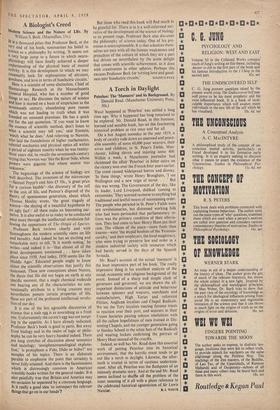A Biologist's Creed
111E SPECTATOR, APRIL 4, 1958 Modern Science and the Nature of Life. By. very end of his book, summarises his belief in science as a philosophy by writing, 'It seems not Understanding of the physical basis of mental activity. It is this development to which we may goodness, and love in terms of bioelectric circuits.' a very large jump to a future in which neuro- Physiology will have finally achieved a deeper reasonably look for explanations of altruism, IT is a thousand pities that Professor Beck, at the
Here is a scientist of some distinction, Chief of
Mrnatology Research at the Massachusetts General Hospital, who has a number of good things to say. He discusses the nature of science and how it started on a basis of empiricism in the seventeenth century, abandoning pure reason Which was not leading to truth when it was founded on unsound premisses. He has a quick eYe for the apt quotation. 'If you want to know the essence of scientific method, don't listen to what a scientist may tell you,' said Einstein, `Watch what he does.' And referring to Newton, who laid the foundations of higher mathematics, celestial mechanics and physical optics all within a Period of eighteen months when he was twenty- three years old, he recalls the seventeenth-century saying that Newton was 'like the River Nile, whose Powers were gigantic but whose source was unknown.'
The beginnings of the science of biology Ware Well described. The invention of the microscope
Samuel Pepys's cost him £5 10s., 'a great price for a curious bauble'—the discovery of the cell as the unit of life, and Pasteur's disproof of the theory of spontaneous generation, about which Thomas Huxley wrote, 'the great tragedy of science—the slaying of a beautiful hypothesis by an ugly fact': all these make an interesting nar- rative. It is also useful to us today to be conducted once more through the intellectual revolution fol- lowing the appearance of The Origin of Species.
Professor Beck reviews clearly and with thoroughness the modern scientific views on life and heredity. And indeed he has an exciting and remarkable story to tell. 'It is worth noting,' he writes—and indeed it is—`that almost all of the great developments, mentioned . . . have taken Place since 1950. And today, 1950 seems like the Middle Ages.' Educated people ought to know about the scientific observations that justify this statement. These new conceptions about Nature, the thesis that life did not begin on earth at any specific moment, that a single chemical molecule not bearing any of the characteristics we con- ventionally attribute to a living creature may nevertheless possess certain properties of life, these are part of the profound intellectual revolu- tion of our day.
It is one of the less agreeable discoveries of science that a stale egg is as nourishing as a fresh one. Unfortunately the curate's egg was not tempt- ing to the appetite. As I have already indicated, Professor Beck's book is good in parts. But away from biology and in the realm of logic or philo- sophy he can be very heavy-handed indeed. There are long stretches of discussion about semantics and tautology; `semiphenomenological explana- tion,' is protoplasm a Fido, Dido or bobo?' are samples of his topics. There is an elaborate parable to emphasise the point that certainty is never fully attained. And there is the facetiousness which is distressingly common in American scientific books written for the general reader. It is also painfully true that Britain and America may on occasion be separated by a common language. Is it really a good idea `to introspect the relevant things that go on in our heads'?
But those who read this book will find much to be grateful for. There is in it a well-informed nar- rative of the development of the science of biology to its present stage. Professor Beck also discusses the philosophy of science today. One of his pre- misses is unexceptionable. It is that scientists them- selves are men with all the human weaknesses and prejudices of the culture of which they are a part but driven on nevertheless by the acute delight that comes with scientific achievement, as it does with creativeness in other spheres. Perhaps this excuses Professor Beck for turning love and good-
ness into 'bioelectric circuits.' MAGNUS PYRE






























 Previous page
Previous page